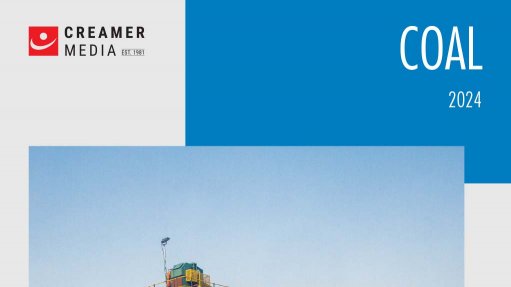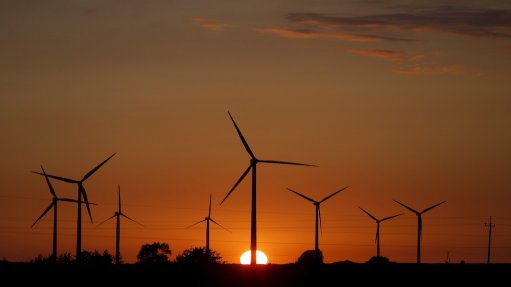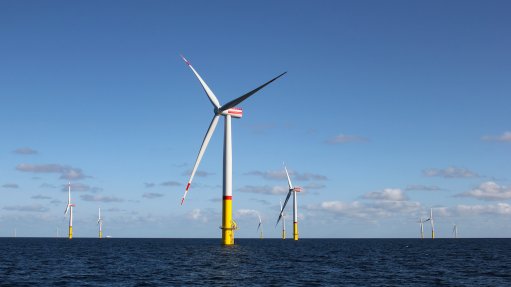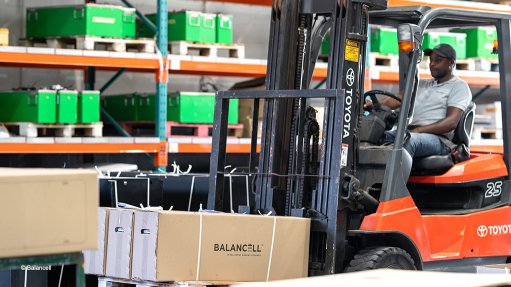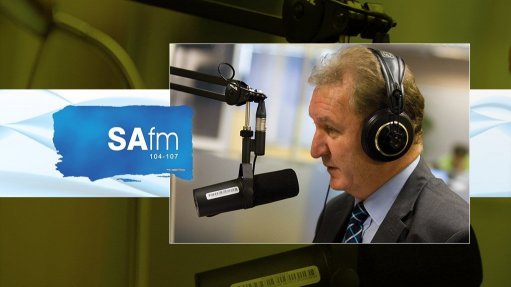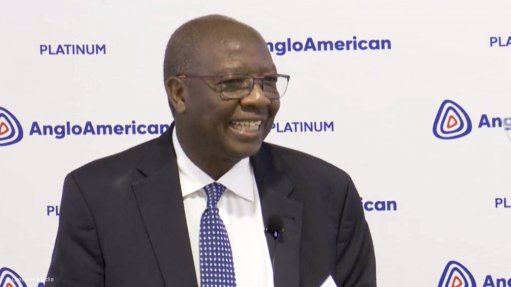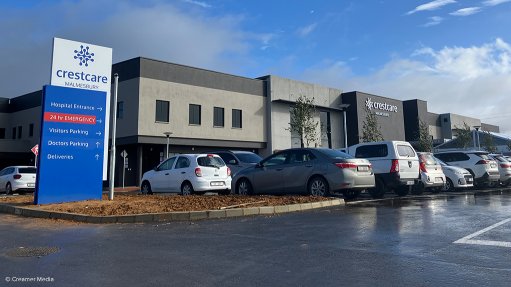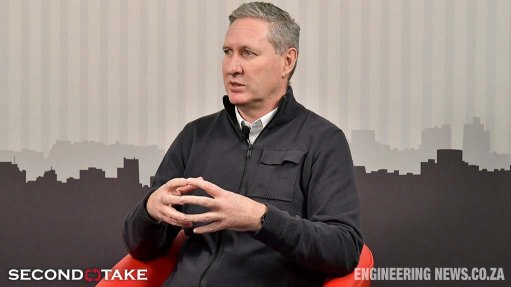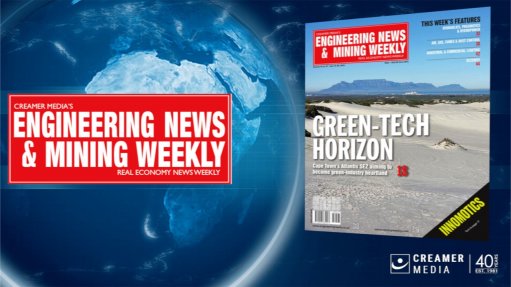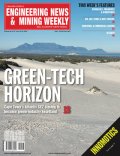Natural gas facilitates more ammonia output
The introduction of natural gas from May next year has provided Sasol Nitro with an opportunity to debottleneck its ammonia plant in Sasolburg and simultaneously unlock the additional capacity, Sasol Nitro MD Lean Strauss tells Engineering News in an exclusive interview.
Sasol Nitro turns over R4,5-billion a year, representing 11% of Sasol Chemical Industries’ turnover and employing some 2 000 people.
The company currently produces 640 000 t a year of ammonia from synthetic gas derived from the traditional coal gasification process in Sasolburg and Secunda.
It operates two nitric acid plants, one a 315 000 t/y unit in Sasolburg, linked to a downstream facility that produces ammonium nitrate, which is in turn processed to produce low-density ammonium nitrate for the production of explosives.
The 470 000 t/y nitric acid plant in Secunda supplies a downstream ammonium nitrate plant, which is used in a 500 000 t/y fertiliser-granulation facility that produces limestone ammonium nitrate (LAN) and various fertilisers containing nitrogen, phosphorus and potas-sium.
In Phalaborwa, next to the phosphate rock mines of Foskor, Sasol Nitro operates a 325 000 t/y phosphoric acid plant, the low-cadmium igneous rock used making the product highly suitable for industrial and food-grade applications.
Its phosphoric acid is exported to India, Japan and Europe and used within the Sasol group for the production of fertiliser and sodium tri-poly-phosphate, the main component of detergents.
Sasol Nitro manufactures bulk, blended and packaged explosives at various sites close to mining customers, as well as a range of related explosives accessories, notably electronic detonators.
The company’s ammonium nitrate value chain contributes 65% of total turnover, the phosphoric acid value chain providing 30% and the remaining 5% is contributed by the explosives accessories business.
Strauss’s strategy is to pursue value growth rather than volume growth.
Value growth will be sought in all three businesses from the optimisation of the value chains of all three businesses, in which synergies will be improved, efficiencies increased and costs reduced.
Through the nitrates value chain, the company is in the flexible position of being able to vary fertiliser and explosives production to match market demand.
Most of the current capital expenditure is directed towards environmental protection, the bulk being expended at Secunda and Phalaborwa.
Some R30-million will be invested this year in environmental projects and that level of expenditure will continue into the next financial year, GM operations Robert Wiggett tells Engineering News.
At Secunda, the expenditure will ensure legal compliance with more stringent stack-emissions regulations and at Phalaborwa, the capital is being directed towards water management in terms of the National Environmental Management and Water Acts.
Particular attention has to be paid to environmental control at Phalaborwa given that it is located in a sensitive ecotourism area on the Selati river and bordering on the Kruger National Park.
Every effort is made to combine wealth creation with environmental protection, though the predominant driver remains the need to operate as a responsible corporate citizen.
For instance, at the polyphosphate plant in Sasolburg, phosphates and sulphates being recovered from effluent will be turned into saleable products.
The fertiliser industry is known as a waste generator but, with Sasol’s new zero-effluent approach, considerable investment is being directed towards efficient waste management.
In the past, the company had eight dams at Secunda to treat the large volume of fertiliser effluent.
The impounded effluent contains valuable product, most of which is now being recovered and two of the larger effluent dams closed.
Sasol Nitro has seen big improve-ments in material usage efficiencies in the past year and a further 3% improvement in the efficiency of Secunda’s raw material usage is being budgeted in the new financial year.
Business optimisation has become the company’s main profit driver, Strauss reports.
Until recently, the company exported close to 150 000 t of explosives a year, but the strong rand has reduced this by some 100 000 t as well as 50 jobs, as it became unprofitable to continue most exports.
Instead, most of the tonnage previously exported is now being diverted into the local production of LAN.
Sasol Nitro traditionally imports about 15% of the 500 000 t of urea that is brought into South Africa every year and will now push to replace imported urea with local LAN. The exporting of its state-of-the-art electronic blasting initiation system is going strongly, with export sales expected to exceed local sales in the new financial year. Sasol Nitro also has two international joint ventures (JVs), Sasol Southwest Energy, in the US, and Sasol Roche Blasting Services, in Australia, and a local JV with Ensign-Bickford, of the US. All these JVs are involved in the explosives and related accessories businesses.
Comments
Press Office
Announcements
What's On
Subscribe to improve your user experience...
Option 1 (equivalent of R125 a month):
Receive a weekly copy of Creamer Media's Engineering News & Mining Weekly magazine
(print copy for those in South Africa and e-magazine for those outside of South Africa)
Receive daily email newsletters
Access to full search results
Access archive of magazine back copies
Access to Projects in Progress
Access to ONE Research Report of your choice in PDF format
Option 2 (equivalent of R375 a month):
All benefits from Option 1
PLUS
Access to Creamer Media's Research Channel Africa for ALL Research Reports, in PDF format, on various industrial and mining sectors
including Electricity; Water; Energy Transition; Hydrogen; Roads, Rail and Ports; Coal; Gold; Platinum; Battery Metals; etc.
Already a subscriber?
Forgotten your password?
Receive weekly copy of Creamer Media's Engineering News & Mining Weekly magazine (print copy for those in South Africa and e-magazine for those outside of South Africa)
➕
Recieve daily email newsletters
➕
Access to full search results
➕
Access archive of magazine back copies
➕
Access to Projects in Progress
➕
Access to ONE Research Report of your choice in PDF format
RESEARCH CHANNEL AFRICA
R4500 (equivalent of R375 a month)
SUBSCRIBEAll benefits from Option 1
➕
Access to Creamer Media's Research Channel Africa for ALL Research Reports on various industrial and mining sectors, in PDF format, including on:
Electricity
➕
Water
➕
Energy Transition
➕
Hydrogen
➕
Roads, Rail and Ports
➕
Coal
➕
Gold
➕
Platinum
➕
Battery Metals
➕
etc.
Receive all benefits from Option 1 or Option 2 delivered to numerous people at your company
➕
Multiple User names and Passwords for simultaneous log-ins
➕
Intranet integration access to all in your organisation





